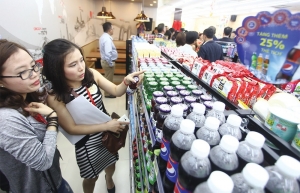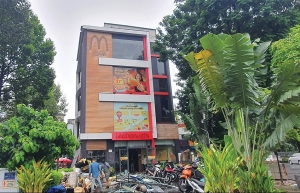Restructuring can help F&B groups optimise profit
What advice do you offer your clients to help them stay resilient in terms of adopting technology?
 |
| Taku Tanaka, founder and CEO of food sourcing platform Kamereo |
During economic downturns, staying resilient requires delivering value that exceeds customer expectations. It’s all about going above and beyond what they anticipate. This approach applies to both service and product quality in the food and beverages (F&B) industry. But behind the scenes, running a restaurant involves managing a complex supply chain, and that’s where things get challenging.
In Vietnam, many restaurants still rely heavily on traditional wet markets, which have limited stock-keeping units and inconsistent supply. Managing these relationships and orders can be overwhelming, and if a supplier falls through, you’re left scrambling to source ingredients at the last minute.
I started my business to solve that very problem. I wanted to create a one-stop solution where F&B businesses could source everything they need so they could focus on the aspects that truly add value.
Our goal is to support restaurants by simplifying their operations, so they can concentrate on innovation and creativity, rather than being bogged down by the complexities of supply chain management.
By offering this comprehensive service, we aim to help restaurants thrive, even in tough times, allowing them to focus on what really matters: creating more exceptional customer experiences.
Experts advise that in terms of global expansion, maintaining authenticity while adapting to local cultures is key. How do you see working for Vietnam’s F&B industry?
Global expansion can seem daunting, but in some markets, like Japan, it’s becoming more straightforward. Vietnamese cuisine, especially banh my, is gaining serious traction in Japan, which highlights how well our food culture is being received globally.
Another notable trend is the labour shortage in Japan’s F&B sector. Many young people in Japan are opting out of F&B jobs due to the tough working conditions. As a result, many restaurants are increasingly hiring foreign workers, with Vietnamese staff constituting a significant portion of the workforce.
On a recent trip to Japan, I visited a restaurant where all the staff were Vietnamese, and they spoke perfect Japanese. What’s interesting is that many of these Japanese F&B businesses are now considering expansion into Vietnam, leveraging their Vietnamese staff who already know their operations inside out. This gives them a smooth entry into the market, with minimal disruption to their operational model.
However, one of the key challenges in Vietnam’s F&B sector is securing capital. In many other countries, F&B is seen as a stable business, allowing companies to access bank loans relatively easily. But in Vietnam, it’s much harder to get bank financing for F&B ventures. Banks often require substantial collateral or proof of long-term profitability, which can be a hurdle for many businesses. As a result, private equity has become a common route for funding, though it can be a lengthy and complex process.
That said, there’s been a surge of interest from Japanese investors looking to capitalise on Vietnam’s potential. Japanese companies are becoming major capital providers for Vietnamese F&B businesses. This influx of investment could accelerate expansion significantly, allowing local companies to grow at a much faster pace - opening multiple locations rather than waiting years to build organically.
Over 30,000 F&B outlets in Vietnam, including stores from well-known chains like McDonald’s, Starbucks, and The Coffee House, have recently closed. What’s your take on this?
While these closures might seem concerning, Vietnam’s F&B industry still boasts immense potential. I believe the closure of these outlets can be attributed to a number of factors.
One of the main issues is related to rent. In many cases, landlords have significantly increased rental rates, making it difficult for businesses to justify staying in certain locations. I’ve had customers who were running successful outlets, but they chose to shut because new rents were too high.
This is something specific to the Vietnamese real estate market - landlords here tend to be aggressive. As a result, many well-known brands are choosing to move to new locations where rent is more manageable. So while it looks like they’re closing stores, it’s often more of a strategic move to reduce overhead costs.
As for some of the famous brands shutting down multiple locations, they’re likely restructuring to better manage their rent expenses and optimise their profit and loss. The industry is likely going through a period of adjustment, where companies restructure and adapt to rising costs, but the long-term potential remains promising for those who can navigate these challenges effectively.
 | F&B companies ramp up net-zero missions The risk of supply chain disruptions and reduced raw material availability due to climate change is prompting the food and beverage industry to accelerate its transition towards greener and more sustainable practices. |
 | F&B players remain upbeat about market Despite unexpected store closures showing no sign of stopping, food and beverage (F&B) businesses remain optimistic about the prospects for growth and the future of the market in Vietnam. |
What the stars mean:
★ Poor ★ ★ Promising ★★★ Good ★★★★ Very good ★★★★★ Exceptional
Related Contents
Latest News
More News
- PM outlines new tasks for healthcare sector (February 25, 2026 | 16:00)
- Ho Chi Minh City launches plan for innovation and digital transformation (February 25, 2026 | 09:00)
- Vietnam sets ambitious dairy growth targets (February 24, 2026 | 18:00)
- Masan Consumer names new deputy CEO to drive foods and beverages growth (February 23, 2026 | 20:52)
- Myriad risks ahead, but ones Vietnam can confront (February 20, 2026 | 15:02)
- Vietnam making the leap into AI and semiconductors (February 20, 2026 | 09:37)
- Funding must be activated for semiconductor success (February 20, 2026 | 09:20)
- Resilience as new benchmark for smarter infrastructure (February 19, 2026 | 20:35)
- A golden time to shine within ASEAN (February 19, 2026 | 20:22)
- Vietnam’s pivotal year for advancing sustainability (February 19, 2026 | 08:44)

 Tag:
Tag:




















 Mobile Version
Mobile Version